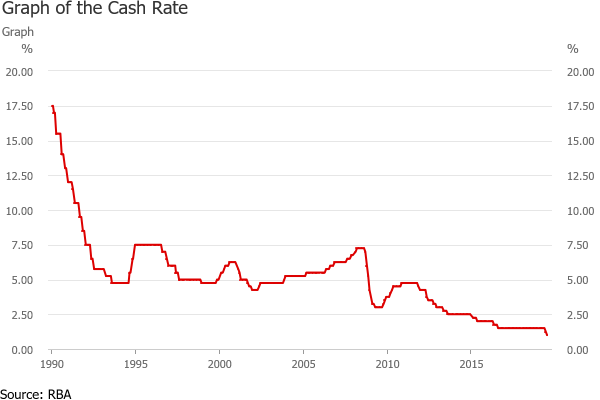What are you going to do now that the interest on your mortgage is lower?
Will you keep your payments the same and pay off your mortgage faster?
If past history is an indicator that's what's likely to happen - however I'm not sure that's such a good idea- but more on that in a minute.
The July rate cut from the Reserve Bank dropping the official cash rates to 1.0% is old news by now.
By the way – this is the lowest interest rate on record.
This chart, supplied by the RBA shows the change in the official cash rate over the last 30 years.
So what will Australian's do now?
This was a question that was looked into by Glenn - the Census expert at id.com.au
He came to the conclusion that last time interest rates fell - in the 5-year Census period from 2011 to 2016 the cash rate declining from 4.75% to 1.5% over 3 years – a 3.25% reduction, Australian mortgage payments remained much the same.
Now the banks didn’t pass on all of the rate cuts, but home loan rates were much lower in 2016 than they were in 2011.
The Census records how much people pay on their mortgage and the interesting thing is that from 2011 to 2016, mortgage repayments were almost the same, across Australia – showing only a very minor decline in some places and small increases in others at a time when interest rates dropped significantly.
Nationally, monthly mortgage payments declined from $1,800 to $1,755 per week.
id.com.au published this fact in 2017 in this article.
Mortgage repayments, by State – 2011 vs 2016 Census
| 2016 | 2011 | Change | |
| New South Wales | $1,986 | $1,993 | -$ 7 |
| Victoria | $1,728 | $1,700 | $ 28 |
| Queensland | $ 1,733 | $1,850 | -$ 117 |
| South Australia | $1,491 | $1,500 | -$ 9 |
| Western Australia | $1,993 | $1,950 | $ 43 |
| Tasmania | $1,300 | $1,300 | $ – |
| Northern Territory | $2,167 | $2,054 | $ 113 |
| Australian Capital Territory | $2,058 | $2,167 | -$ 109 |
They concluded that:
If mortgage repayments didn’t go down over this time, there could be two main reasons for this:-
-
People are paying more for houses: prices certainly went up – so the amount of mortgages for first home buyers has tended to increase over time. But many people upgrade,
or are paying off an older mortgage so their mortgage doesn’t go up when their house value goes up. So for the majority of the population, not buying in at the increasing prices, their mortgages should go down, right?
-
People continue to pay off a higher amount: (really set at the amount they can afford to pay) and when interest rates fall, they just pay off more of the principal.
In reality it's probably a combination of the two – prices going up, so people borrowing more at lower interest rates, while existing mortgagors are continuing to pay a larger amount.
The demographers at id.com.au explained that there is evidence for the latter point from the RBA – the following chart confirms that homeowners increased their payment of loan principals between 2011 and 2016.
So, while interest payments went down as a share of income, total payments still hovered around 12% of income.
So what should you do?
I don't know your circumstances, but I know the typical advice from financial planners is to pay off your home mortgage as quickly as possible.
I don't necessarily agree.
Sure it's important not to squander the benefits of the interest rate cuts nor the coming tax refund, but rather than paying down your mortgage I'd prefer to see you paying any extra (above the minimum loan repayment) into an offset account.
This will give you some financial flexibility in case you need the funds, but it will have the same net effect as paying down your mortgage.
But here is where you need advice from a savvy finance strategist.
If you're then planning to use the extra equity in your home (now that you've effectively paid down more of your mortgage) be careful from which loan you take your deposit payment.
If you take it from the offset account attached to your home loan it may not be tax deductible as you will be mixing your personal (non tax deductible debt) with investment (tax deductible) debt.
This may then be the right time to pay down your mortgage and take out a different loan against your home (with the increased equity) purely for investment purposes - such as using it as a deposit for your next investment.
Get sound advice and structure your loans correctly.




 or are paying off an older mortgage so their mortgage doesn’t go up when their house value goes up. So for the majority of the population, not buying in at the increasing prices, their mortgages should go down, right?
or are paying off an older mortgage so their mortgage doesn’t go up when their house value goes up. So for the majority of the population, not buying in at the increasing prices, their mortgages should go down, right?













